Washington's port infrastructure demands rigorous background screening protocols that satisfy federal TWIC requirements, state maritime regulations, and international security standards. This comprehensive guide addresses the specialized screening challenges facing port authorities, maritime employers, and transportation workers navigating multi-jurisdictional compliance requirements in one of America's busiest international trade gateways.
Key Takeaways
- Washington ports process over $75 billion in international cargo annually, requiring elevated security screening standards for all maritime workers
- Transportation Worker Identification Credential (TWIC) background checks are federally mandated for unescorted access to secure port areas
- Seattle and Tacoma port employment screening includes criminal history checks spanning seven years, with specific maritime industry disqualifiers
- Maritime worker background verification typically takes 4-8 weeks when TWIC applications are involved, requiring strategic planning by employers
- Washington state law prohibits consideration of certain criminal convictions beyond specified timeframes, creating unique compliance challenges
- Port authority hiring requirements include multi-jurisdictional checks covering federal, state, and international databases
- Pre-employment drug testing and ongoing random screening are mandatory for most safety-sensitive port positions
- Specialized maritime background check providers offer compliance management systems that reduce processing time by 30-40% compared to generic screening services
Understanding Washington Port Worker Background Check Requirements
Washington State operates some of the Pacific Northwest's most critical maritime infrastructure. The Seattle-Tacoma port complex ranks among the top ten container ports in North America. The state's position as an international trade gateway to Asia means port worker background checks must satisfy overlapping federal, state, and international security frameworks.
These requirements protect not only the physical port facilities but also national supply chain integrity. They address homeland security interests across multiple regulatory jurisdictions. The Transportation Security Administration (TSA) establishes baseline security standards through the TWIC program, which applies to approximately 15,000 maritime workers across Washington's port facilities.
Beyond federal mandates, Washington employers must navigate state-specific fair chance hiring laws. They also face maritime industry regulations and union collective bargaining agreements that shape screening protocols. This complex regulatory environment requires specialized expertise that generic background check providers typically cannot deliver.
Federal TWIC Requirements for Washington Maritime Workers
The Transportation Worker Identification Credential serves as the cornerstone of port security background checks across all Washington maritime facilities. Established under the Maritime Transportation Security Act of 2002, TWIC requirements apply to longshoremen, port facility employees, and truck drivers with port access. The credential also covers maritime vessel crew members and any workers requiring unescorted access to secure areas.
Washington maritime employers must verify TWIC status before granting facility access. This creates a two-stage verification process that ensures comprehensive security. First, workers must obtain their TWIC card by submitting to TSA background checks and biometric enrollment. Second, employers must independently verify the credential's validity through TSA's online system or electronic readers installed at facility access points.
The TWIC background check examines specific permanently disqualifying offenses and interim disqualifying offenses with defined lookback periods. Permanently disqualifying crimes include espionage, sedition, treason, and terrorism-related offenses. Interim disqualifying offenses prevent TWIC issuance for specified periods and include felonies involving firearms, explosives, dishonesty, violent crimes, and drug trafficking convictions within the past seven years.
TWIC Application Process and Timeline
TSA processes approximately 2.5 million TWIC applications nationally each year. Washington accounts for a significant portion given the state's maritime industry size. The application process begins with online pre-enrollment, followed by an in-person appointment at enrollment centers located in Seattle, Tacoma, Everett, and Vancouver.
Applicants must provide specific documentation and complete several requirements:
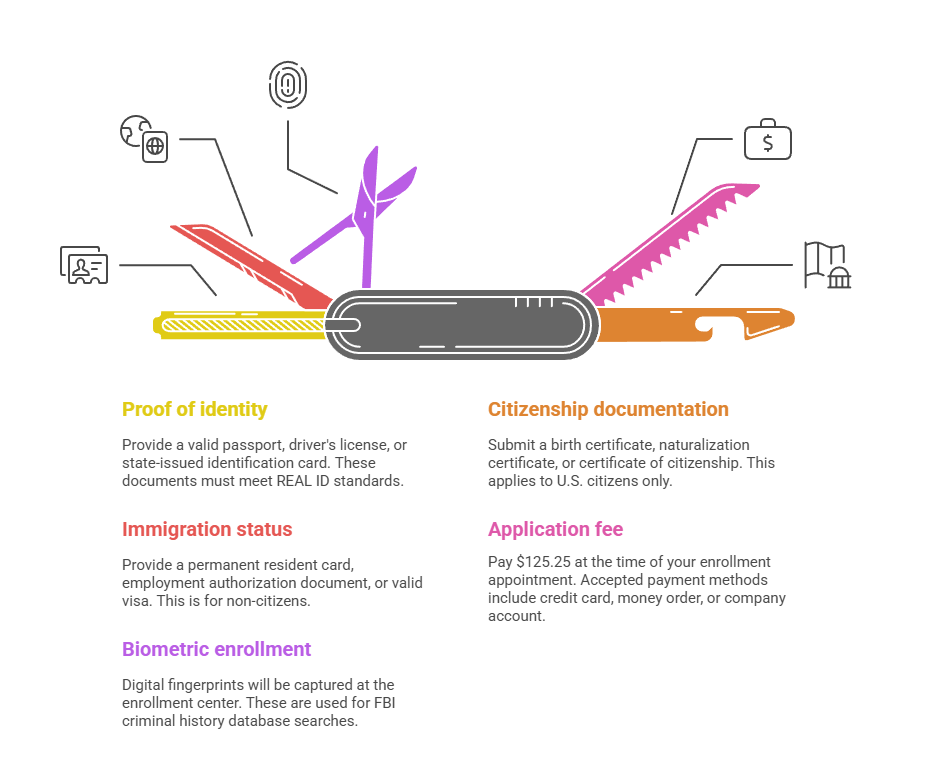
- Proof of identity: Valid passport, driver's license, or state-issued identification card meeting REAL ID standards.
- Citizenship documentation: Birth certificate, naturalization certificate, or certificate of citizenship for U.S. citizens.
- Immigration status verification: Permanent resident card, employment authorization document, or valid visa for non-citizens.
- Application fee payment: $125.25 paid at the time of enrollment appointment via credit card, money order, or company account.
- Biometric enrollment: Digital fingerprints captured at enrollment center for FBI criminal history database searches.
Background check processing typically requires 4-6 weeks from the enrollment appointment. Complex cases involving criminal records or international work history may extend to 8-12 weeks.
Waiver and Appeal Options
TSA provides waiver and appeal mechanisms for applicants who receive preliminary credential denial. The waiver process allows individuals to request exceptions to interim disqualifying offenses. Applicants must demonstrate rehabilitation and present mitigating circumstances through extensive documentation.
Successful waivers typically involve convictions near the end of lookback periods. They require evidence of exceptional rehabilitation and strong employment records following conviction. Appeals focus on challenging the accuracy of background check information rather than seeking exceptions to disqualifying standards. The appeals process can extend 8-12 weeks, making proactive screening before TWIC application submission valuable for identifying potential issues early.
Seattle Port Employment Screening Standards
The Port of Seattle operates the third-largest container terminal in North America and Seattle-Tacoma International Airport. The port employs over 1,800 direct workers and supports nearly 200,000 regional jobs. Seattle port employment screening exceeds basic TWIC requirements, incorporating comprehensive criminal background checks, employment verification, education verification, and drug testing.
Seattle port authority hiring requirements distinguish between three worker categories. Direct port employees undergo the most comprehensive screening, including seven-year criminal history checks and reference verification. Tenant companies operating at port facilities must implement screening programs that meet or exceed minimum port security standards. The port collaborates with Seattle's fair chance employment ordinance, which restricts how employers may use criminal history information.
Employers cannot inquire about criminal history until after determining a candidate is otherwise qualified. They must conduct individualized assessments of convictions and provide candidates an opportunity to present mitigating information. These requirements create compliance challenges when balanced against federal security mandates, requiring carefully structured screening processes that satisfy both frameworks.
Position-Specific Screening Requirements
Different port positions trigger distinct background check components based on security sensitivity and operational risk. The variation in screening requirements means employers must implement position-specific screening matrices that clearly define which checks apply to each role category. This systematic approach ensures compliance with minimum security standards while avoiding over-screening that could unnecessarily delay hiring or violate fair chance employment principles.
Port positions require tailored screening components that reflect their unique security and operational risks:
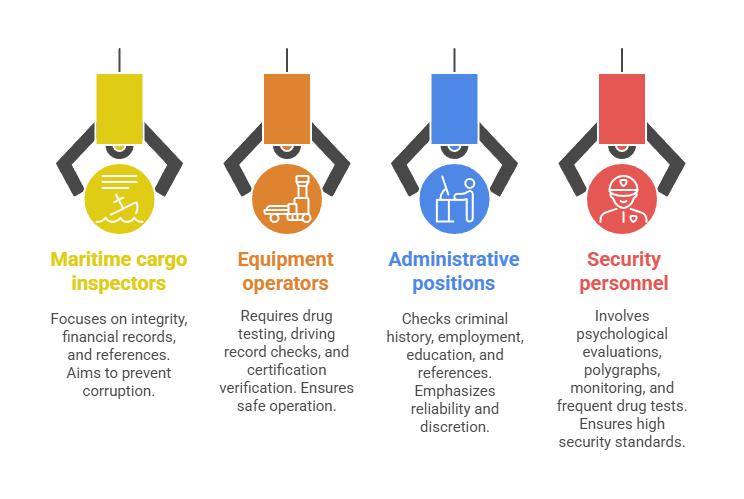
- Maritime cargo inspectors: Enhanced criminal background checks focusing on integrity-related offenses, financial records review to identify potential corruption vulnerabilities, and comprehensive reference checks with former employers in security-sensitive roles.
- Equipment operators: Mandatory drug testing programs including pre-employment and random screening, motor vehicle record checks covering at least seven years, and verification of specialized equipment certifications such as crane operator or forklift licenses.
- Administrative positions: Criminal background checks examining seven-year history, employment verification spanning ten years with direct employer contact, education verification for degree-required positions, and reference checks emphasizing reliability and discretion with sensitive information.
- Security personnel: The most rigorous screening including psychological evaluations, polygraph examinations for certain positions, continuous monitoring programs with periodic rescreening, and random drug testing at higher frequencies than other position categories.
Many port employers work with specialized maritime background check providers who maintain pre-built screening packages aligned with common port position classifications. These standardized packages streamline the hiring process while ensuring consistent application of security standards across similar roles.
Tenant and Contractor Compliance Management
Port of Seattle tenant companies must implement background screening programs that satisfy port security requirements. These companies include terminal operators, cargo handlers, and maritime service providers. The port conducts periodic compliance audits reviewing screening documentation, credential verification processes, and access control records.
Contractors providing services within secure port areas face similar screening requirements. Short-term contractors may operate under escort by badged employees, avoiding full TWIC requirements. However, they still require basic criminal background checks and identity verification. Managing tenant and contractor compliance creates administrative burden for port authorities, leading many to implement credential management systems that centralize verification and track expiration dates.
Tacoma Port Hiring Requirements and Maritime Worker Background Verification
The Port of Tacoma ranks as the eighth-largest container port in North America. It handles over 2 million TEUs (twenty-foot equivalent units) annually and serves as a crucial link in trans-Pacific trade routes. Tacoma port hiring requirements mirror federal TWIC standards while incorporating additional screening elements reflecting the port's specific operational profile.
Maritime worker background verification at Tacoma emphasizes several key security areas. Criminal background checks specifically examine theft-related offenses, fraud convictions, and organized crime connections that could compromise cargo security. Given the port's role in international trade, screening includes enhanced identity verification to detect fraudulent documentation. It also involves searches of international criminal databases for workers with foreign work history or dual citizenship.
Tacoma's proximity to Joint Base Lewis-McChord adds another security dimension. Workers involved in military cargo handling undergo additional screening coordinated with Department of Defense requirements. This includes national security clearance checks for certain positions and enhanced background investigations covering foreign contacts and financial vulnerabilities.
Criminal History Standards and Disqualifiers
Tacoma port employment screening examines criminal history according to TSA's TWIC disqualifier lists, supplemented by port-specific standards addressing cargo security and workplace safety. Seven-year lookback periods apply to most felony convictions, with permanent disqualification for violent crimes involving weapons, sexual offenses, and crimes indicating terrorism connections. Theft-related offenses receive particular scrutiny given cargo security concerns, with even misdemeanor theft convictions potentially disqualifying candidates for cargo handling positions.
| Offense Category | Lookback Period | Typical Disposition |
| Violent felonies | 7 years | Individualized assessment required |
| Theft/fraud felonies | 7 years | Generally disqualifying for cargo access |
| Drug trafficking | 7 years | Disqualifying for most positions |
| DUI convictions | 5 years | Disqualifying for equipment operator roles |
| Terrorism-related | Permanent | Automatic disqualification |
Washington's fair chance hiring law requires individualized assessment of criminal history. Port employers must document these assessments, demonstrating that disqualification decisions reflect legitimate security concerns rather than blanket criminal history exclusions.
International Worker Screening Protocols
Tacoma's role in international trade means its workforce includes significant numbers of foreign nationals and workers with extensive international experience. Background screening for international workers presents unique challenges due to several factors. Criminal records in many countries are difficult to access and lack the standardization of U.S. criminal history databases.
For workers who have lived abroad for extended periods, comprehensive international background checks examine multiple verification components:
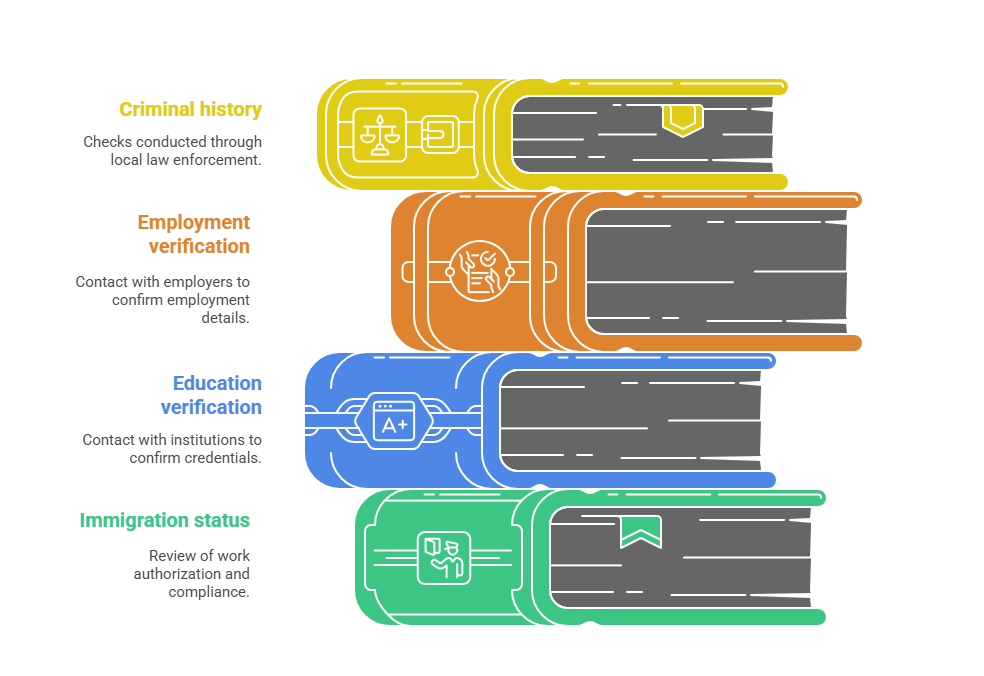
- Criminal history searches: Country-specific criminal record checks in all nations where the worker resided for six months or longer, conducted through local law enforcement agencies, court systems, or international screening partners.
- Employment verification: Contact with foreign employers to confirm dates of employment, positions held, job responsibilities, reasons for departure, and eligibility for rehire, often requiring translation services and extended response times.
- Education verification: Direct contact with international educational institutions to confirm degrees, diplomas, certificates, and specialized maritime training credentials, accounting for varying academic systems and credential formats across countries.
- Immigration status verification: Comprehensive review of work authorization documents, visa status, permanent resident status, and compliance with federal employment eligibility requirements through E-Verify and Department of Homeland Security databases.
These checks typically require 6-12 weeks due to communication delays and translation requirements. Integration between immigration verification and background screening streamlines the process, reducing redundant data collection and accelerating hiring timelines.
Transportation Worker Identification Credential Check Components
The TWIC background check encompasses multiple screening elements designed to identify security threats while protecting critical maritime infrastructure. Understanding these components helps employers anticipate potential issues and prepare candidates for the process. TSA conducts criminal history checks through the FBI's Criminal Justice Information Services division, accessing fingerprint-based criminal history records from all 50 states and U.S. territories.
This comprehensive approach identifies convictions that might not appear in commercial database searches. The fingerprint requirement ensures accurate identification, eliminating the false positives that can occur with name-based searches alone. Immigration status verification examines Department of Homeland Security databases to confirm work authorization and identify immigration violations.
Terrorism watch list screening represents perhaps the most critical TWIC component. It checks applicants against multiple terrorism-related databases maintained by federal intelligence and law enforcement agencies. The classified nature of these databases means applicants rarely receive detailed explanations if denied on terrorism-related grounds, though appeal rights exist.
Criminal History Disqualifiers and Lookback Periods
TWIC criminal history standards distinguish between permanent disqualifying offenses that always prevent credential issuance and interim disqualifying offenses that create time-limited bars. Permanent disqualifiers include espionage, sedition, treason, terrorism-related crimes, and certain immigration violations that suggest national security concerns. These offenses lack expiration provisions, meaning convictions at any point in an applicant's history result in credential denial.
Interim disqualifying offenses include a broader range of serious crimes that prevent TWIC issuance for specified periods:
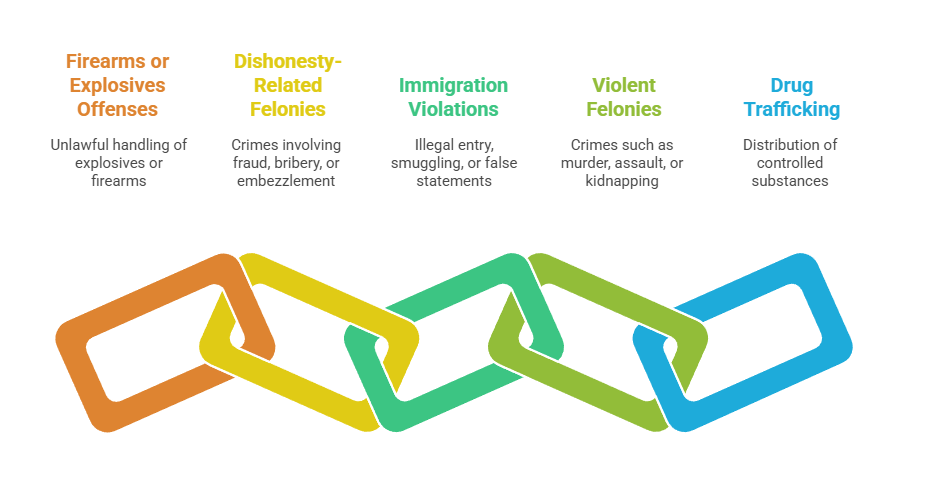
- Firearms or explosives offenses: Unlawful possession, use, manufacture, distribution or storage of explosive materials or firearms, with seven-year disqualification period.
- Dishonesty-related felonies: Fraud, bribery, extortion, or embezzlement, with seven-year disqualification.
- Immigration violations: Illegal entry, smuggling, or false statements, with seven years for most violations.
- Violent felonies: Murder, assault with intent to kill, kidnapping, or aggravated sexual abuse, with seven-year disqualification.
- Drug trafficking: Distribution or intent to distribute controlled substances, with seven-year disqualification.
The lookback periods begin from conviction date or prison release date, whichever is later. Understanding these nuances helps employers counsel candidates on eligibility and avoid investing resources in hiring processes likely to fail at the TWIC stage.
Specialized Maritime Background Check Providers
The complexity of Washington port worker background checks has created demand for specialized screening providers. These providers understand maritime industry requirements, federal security regulations, and state-specific compliance challenges. They offer integrated screening solutions that combine TWIC application assistance, comprehensive criminal background checks, and employment verification.
Specialized maritime background check providers maintain relationships with port authorities. They have familiarity with collective bargaining agreements affecting screening practices and expertise in international worker verification. This industry knowledge translates to more efficient screening processes, fewer compliance errors, and better candidate experience. Providers serving Washington's maritime industry typically offer local enrollment services for TWIC applications, reducing travel burdens on candidates.
Technology platforms distinguish leading maritime screening providers. They offer applicant tracking integration, automated workflow management, real-time status updates, and compliance reporting dashboards. These systems reduce manual administrative work and provide visibility into screening pipeline status. Integration with human resources information systems and access control platforms creates seamless data flow from initial screening through credential issuance.
Service Features and Compliance Support
Comprehensive maritime background check services extend beyond basic criminal history searches to address the full spectrum of port security requirements. Leading providers offer integrated service packages that streamline the screening process and ensure compliance with complex regulatory frameworks. These services reduce administrative burden on port employers while accelerating time-to-hire for qualified candidates.
Maritime screening providers deliver specialized services tailored to port industry needs:
- Employment verification: Traces work history spanning seven to ten years, contacting former employers directly to confirm dates of employment, positions held, eligibility for rehire, performance issues, and for maritime-specific roles, confirmation of vessel types, cargo types, and credentials held.
- Education verification: Confirms degrees, certificates, and specialized maritime training credentials by contacting educational institutions directly rather than relying on candidate-provided documentation, essential given the prevalence of credential fraud in security-sensitive industries.
- Maritime credential verification: Verifies Merchant Mariner Credentials, tankerman certifications, crane operator licenses, and other specialized maritime qualifications with issuing agencies to ensure validity and check for disciplinary actions or suspensions.
- Drug testing coordination: Manages collection site networks nationwide, laboratory analysis with certified facilities, medical review officer services for result interpretation, and results reporting through secure portals, typically including five-panel or ten-panel screens examining amphetamines, cocaine, opiates, marijuana, and PCP.
These comprehensive service packages ensure that all screening components are completed efficiently and in compliance with federal and state requirements. Providers offering end-to-end solutions reduce the coordination burden on employers managing multiple vendor relationships.
Ongoing Monitoring and Compliance Management
Background screening doesn't end with initial hiring. Evolving regulations require continuous monitoring of maritime worker credentials and criminal history. Ongoing monitoring programs automatically alert employers to criminal convictions, TWIC revocations, license suspensions, and other disqualifying events occurring after initial hiring.
The frequency and scope of ongoing monitoring varies by position sensitivity and employer policy. High-security positions may warrant monthly monitoring, while standard port workers might undergo quarterly or annual checks. TWIC renewals every five years provide natural rescreening intervals, though many employers implement more frequent internal checks. Compliance management services help maritime employers navigate Washington's complex regulatory environment, tracking changing requirements and updating screening protocols accordingly.
Washington State Maritime Regulations and Fair Chance Hiring
Washington State employment law significantly impacts how port employers conduct background screening. Fair chance hiring provisions restrict use of criminal history information, creating compliance tensions with federal security requirements. These laws require careful policy development that satisfies both frameworks.
Washington's fair chance hiring law prohibits employers from inquiring about criminal history before making conditional employment offers. It requires individualized assessments of convictions and mandates written explanations when criminal history leads to adverse decisions. The law includes exceptions for positions where federal or state law mandates background checks or restricts hiring based on criminal history. However, employers must carefully document these exceptions and limit background check scope to federally required elements.
State regulations also govern how criminal conviction information may be considered, with lookback periods limiting how far back employers can examine non-conviction arrest records. These limitations sometimes conflict with federal TWIC standards, creating compliance complexity. Best practice involves conducting background checks that satisfy federal requirements while applying state law protections wherever possible.
Balancing Security Needs and Legal Compliance
Port employers must balance legitimate security concerns against Washington's strong worker protections. This tension is particularly acute when federal security requirements conflict with state fair chance provisions. Successful navigation requires policies that clearly document security rationale for background check requirements, limit screening scope to job-relevant factors, and provide structured individualized assessment processes for candidates with criminal history.
Individualized assessment frameworks consider several key factors. These include the nature and gravity of the offense, time elapsed since conviction, nature of the job sought, and evidence of rehabilitation. For port worker positions, the assessment emphasizes cargo security implications, workplace safety concerns, and access to sensitive areas or information. Documentation should demonstrate that disqualification decisions reflect specific security concerns rather than blanket exclusion.
Some employers implement pre-screening processes that occur before formal applications. These provide candidates with criminal history information about likely TWIC eligibility without triggering fair chance hiring law requirements. However, even advisory consultations must avoid creating discriminatory barriers or violating candidate privacy rights.
Best Practices for Port Employers and Maritime Hiring Managers
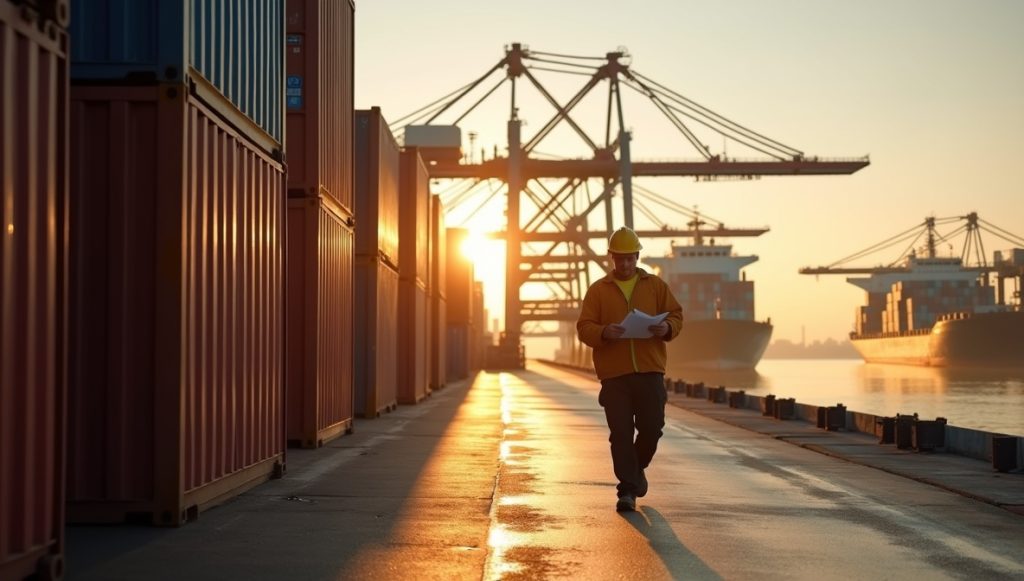
Implementing effective background screening programs requires strategic planning, clear policies, efficient processes, and ongoing compliance management. Washington port employers face unique challenges given the state's complex regulatory environment, diverse workforce, and operational pressures demanding rapid hiring during peak periods. These best practices help organizations build screening programs that protect security while supporting operational needs and legal compliance.
Port employers can optimize their background screening programs through systematic approaches and strategic partnerships:
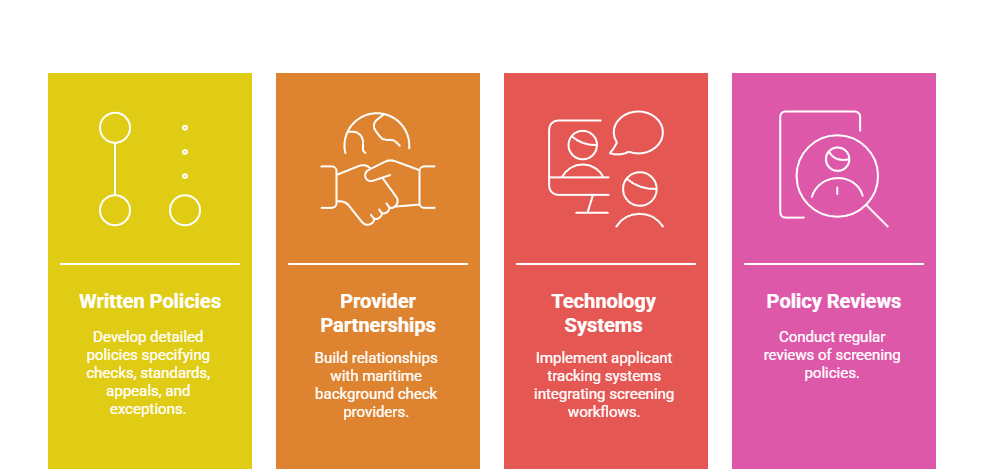
- Comprehensive written policies: Develop detailed background check policies that specify which checks apply to each position classification, outline decision-making standards for criminal history assessment, define appeal processes, and document federal security requirement exceptions to state fair chance hiring laws.
- Specialized provider partnerships: Build relationships with maritime background check providers who understand port industry requirements and Washington's legal landscape, evaluating them based on maritime industry experience, technology platform capabilities, turnaround times, customer service quality, and local presence in Washington.
- Integrated technology systems: Implement applicant tracking systems that integrate background screening workflows, automate status notifications, maintain audit documentation, and generate compliance reports, with cloud-based platforms providing hiring managers real-time visibility into screening status.
- Regular policy reviews: Conduct quarterly or annual reviews of screening policies to ensure alignment with evolving federal regulations, state law changes, port authority policy updates, and union contract modifications affecting background check practices.
These foundational practices create efficient, compliant screening programs that serve both security and operational objectives. Regular evaluation and continuous improvement ensure programs remain effective as regulations and industry standards evolve.
Streamlining the TWIC Application Process
Proactive TWIC application management significantly reduces hiring timeline delays. This is particularly important for positions requiring immediate port access. Consider establishing preferred enrollment center partnerships that can accommodate bulk appointments during major hiring initiatives. Some background check providers offer mobile enrollment services that bring TWIC application processing on-site.
Pre-screen candidates for likely TWIC eligibility before extending conditional job offers. This identifies potential disqualifying criminal history early in the process. While this approach requires careful legal navigation to avoid fair chance hiring law violations, it can be structured as advisory consultation helping candidates understand federal requirements. Early identification of potential issues allows time for waiver applications or appeals before project start dates.
Managing Seasonal Hiring Surges
Washington's ports experience significant seasonal variations in cargo volume, creating periodic demands for rapid workforce expansion. Background screening can become a bottleneck during these surges unless employers implement strategies to accelerate processing. Consider maintaining pools of pre-screened candidates who have completed background checks and TWIC applications.
Establish expedited screening protocols for seasonal positions with limited facility access. This may involve utilizing escorted access arrangements that avoid full TWIC requirements for short-term workers. TSA regulations permit escorted access for workers who do not require unescorted entry to secure areas. Develop relationships with labor providers and staffing agencies that maintain pre-screened maritime worker pools, effectively outsourcing the seasonal hiring surge challenge.
Conclusion
Washington port worker background checks represent complex undertakings requiring specialized expertise, strategic planning, and ongoing compliance management. The state's position as a major international trade gateway demands security screening that satisfies federal TWIC requirements, state fair chance hiring protections, and port authority security standards. Successful programs balance these sometimes conflicting requirements while supporting operational efficiency and protecting the critical maritime infrastructure that drives Washington's economy. As regulations evolve and security threats adapt, maritime employers must maintain flexible screening programs supported by specialized providers who understand the industry's unique compliance landscape.
Frequently Asked Questions
How long does a Washington port worker background check typically take?
Washington port worker background checks typically require 4-8 weeks when TWIC credentials are involved. Standard background checks without TWIC can be completed in 3-5 business days. International worker screening may extend to 12 weeks due to foreign record access challenges and translation requirements. Complex cases involving criminal history or multiple jurisdictions may require additional processing time.
What criminal convictions disqualify workers from obtaining TWIC credentials?
TWIC credentials are permanently unavailable to individuals convicted of espionage, sedition, treason, terrorism-related offenses, and certain immigration violations. Interim disqualifying offenses include violent felonies, firearms violations, drug trafficking, fraud, and other serious crimes that create seven-year bars from conviction or prison release date. The lookback period begins from whichever date is later.
Do Washington state fair chance hiring laws apply to port worker positions?
Washington's fair chance hiring law includes exceptions for positions where federal law mandates background checks or restricts hiring based on criminal history. This applies to most TWIC-required port positions. However, employers must document these federal requirement exceptions and apply state protections to non-TWIC positions and screening elements beyond federal minimums.
Can port workers with criminal history obtain waivers for TWIC denial?
TSA offers waiver processes for interim disqualifying offenses, allowing individuals to present rehabilitation evidence and request exceptions. Waiver approvals are relatively rare and typically require convictions near the end of lookback periods, minor roles in offenses, exceptional rehabilitation evidence, and strong post-conviction employment records. The waiver review process adds 4-6 weeks to credential processing time.
What background checks do Seattle and Tacoma port employers conduct beyond TWIC?
Port employers supplement TWIC screening with employment verification spanning seven to ten years and education verification for positions requiring degrees or certifications. They also conduct motor vehicle record checks for equipment operators and drivers. Drug testing includes five-panel or ten-panel screens, and reference checks emphasize reliability and security consciousness.
How do international workers complete background checks for Washington port employment?
International workers undergo country-specific criminal background checks in nations where they previously lived or worked. They also complete employment verification with foreign employers and education verification with international institutions. Immigration status verification confirms work authorization. These checks typically require 6-12 weeks due to foreign agency response times and translation needs.
What ongoing monitoring do port employers conduct after initial hiring?
Port employers implement continuous monitoring programs that track criminal convictions, TWIC revocations, license suspensions, and motor vehicle violations occurring after hire. Monitoring frequency varies from monthly for high-security positions to quarterly or annual checks for standard positions. TWIC renewals every five years provide natural rescreening intervals. Many employers conduct more frequent internal checks between TWIC renewals.
How can maritime employers reduce background check processing times?
Employers can accelerate screening by partnering with specialized maritime background check providers who understand port industry requirements. Implementing pre-screening programs identifies TWIC eligibility issues early in the hiring process. Establishing preferred TWIC enrollment center relationships enables expedited appointments. Utilizing technology platforms that integrate background screening with applicant tracking systems streamlines workflows and reduces processing delays.
Additional Resources
- Transportation Security Administration TWIC Program Overview
https://www.tsa.gov/for-industry/twic - Port of Seattle Employment Opportunities and Requirements
https://www.portseattle.org/page/employment-port-seattle - Port of Tacoma Security and Credentialing Information
https://www.portoftacoma.com/security - Washington State Fair Chance Employment Law Guide
https://www.lni.wa.gov/workers-rights/workplace-complaints/discrimination - Maritime Transportation Security Act Compliance Resources
https://www.dhs.gov/maritime-security - Federal Fair Credit Reporting Act Employment Screening Requirements
https://www.ftc.gov/business-guidance/resources/using-consumer-reports-what-employers-need-know

GCheck Editorial Team
Meet the GCheck Editorial Team, your trusted source for insightful and up-to-date information in the world of employment background checks. Committed to delivering the latest trends, best practices, and industry insights, our team is dedicated to keeping you informed.
With a passion for ensuring accuracy, compliance, and efficiency in background screening, we are your go-to experts in the field. Stay tuned for our comprehensive articles, guides, and analysis, designed to empower businesses and individuals with the knowledge they need to make informed decisions.
At GCheck, we're here to guide you through the complexities of background checks, every step of the way.





